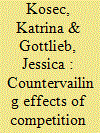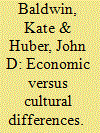| Srl | Item |
| 1 |
ID:
165403


|
|
|
|
|
| Summary/Abstract |
Political competition is widely recognized as a mediator of public goods provision through its salutary effect on incumbents’ electoral incentives. We argue that political competition additionally mediates public goods provision by reducing the efficiency of legislative bargaining. These countervailing forces may produce a net negative effect in places with weak parties and low transparency—typical of many young democracies. We provide evidence of a robust negative relationship between political competition and local public goods using panel data from Mali. Tests of mechanisms corroborate our interpretation of this relationship as evidence of legislative bargaining inefficiencies. To explore the generalizability of these findings, we analyze cross-country panel data and show that political competition leads to better (worse) public goods provision under high (low) levels of party system institutionalization. The paper sheds light on why political competition is only selectively beneficial, and underscores the importance of considering both the electoral and legislative arenas.
|
|
|
|
|
|
|
|
|
|
|
|
|
|
|
|
| 2 |
ID:
105193


|
|
|
|
|
| Publication |
2010.
|
| Summary/Abstract |
Arguments about how ethnic diversity affects governance typically posit that groups differ from each other in substantively important ways and that these differences make effective governance more difficult. But existing cross-national empirical tests typically use measures of ethnolinguistic fractionalization (ELF) that have no information about substantive differences between groups. This article examines two important ways that groups differ from each other-culturally and economically-and assesses how such differences affect public goods provision. Across 46 countries, the analysis compares existing measures of cultural differences with a new measure that captures economic differences between groups: between-group inequality (BGI). We show that ELF, cultural fractionalization (CF), and BGI measure different things, and that the choice between them has an important impact on our understanding of which countries are most ethnically diverse. Furthermore, empirical tests reveal that BGI has a large, robust, and negative relationship with public goods provision, whereas CF, ELF, and overall inequality do not.
|
|
|
|
|
|
|
|
|
|
|
|
|
|
|
|
| 3 |
ID:
165600


|
|
|
|
|
| Summary/Abstract |
This article investigates the role of colonial pressure on state centralization and its relationship to subsequent development by analyzing the influence of Western colonial threats on Siam’s internal political reform. Unlike other countries in the region, Siam remained independent by adopting geographical administrative boundaries and incorporating its traditional governance structures into a new, centralized governance system. The authors find that the order in which areas were integrated into the centralized system depended on the interaction between precentralization political structures and proximity to British and French territorial claims. The authors show that areas centralized early in the process had higher levels of infrastructure investment and public goods provision at the time the centralization process was completed in 1915 than those centralized later in the process. They also show that early centralization during the Western colonial era continued to be strongly associated with higher levels of public goods provision and economic development, and that this relationship persists today.
|
|
|
|
|
|
|
|
|
|
|
|
|
|
|
|